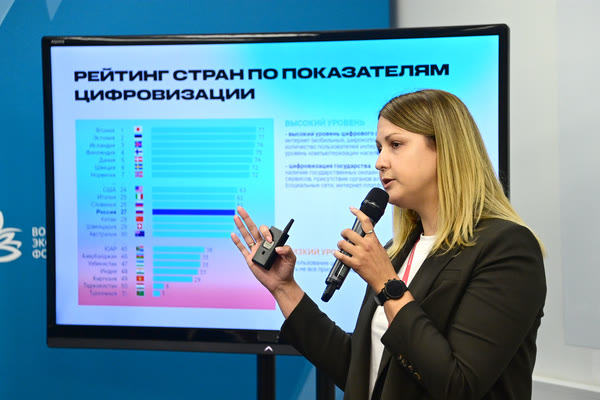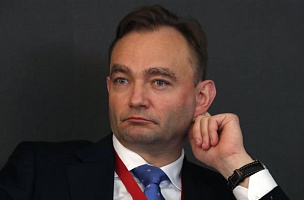KEY CONCLUSIONS
Services of global digital platforms and ecosystems are firmly embedded in everyday life
“Global digital platforms have become an integral part of our life; they are everywhere where there is an Internet connection: search engines, social networks, cloud services. Over the past few years, before our very eyes, those companies have grown into transnational monopolies,” Vadim Glushchenko, Director, Center for Global IT-Cooperation.
“Platforms and ecosystems are a reality, and it makes no sense to argue with that. They are convenient and beneficial for both consumers and manufacturers, including small businesses. They provide direct access to services and goods for the consumer. Ecosystems and platforms allow us to satisfy as many of our needs as possible in the shortest possible time,” Maxim Parshin, Deputy Minister of Digital Development, Communications and Mass Media of the Russian Federation.
Regulation of global digital platforms is a global trend
“The main trend in the world is reinforcement of the regulation of global digital platforms at the national level. Governments are engaged in combating their monopoly positions, countering opaque content moderation, improving the taxation system, and protecting users’ personal data. In 2021, many countries took measures in the sphere of antitrust policy: the European Union, the United Kingdom, and the United States,” Vadim Glushchenko, Director, Center for Global IT-Cooperation.
“Countries that are digital leaders are picking keys to a new industry with varying degree of effectiveness. We are still at the beginning of this long journey. Our legislative actions have logic, they are justified and generally respond to challenges, considering the specifics of our market. Our IT-legislation should be antitrust in spirit, it should contain safeguards against monopolization of our IT-markets by American and Chinese companies,” Anton Gorelkin, Member of the State Duma of the Committee of the Council of the Federation of the Federal Assembly of the Russian Federation on Information Policy, Information Technology and Communications.
PROBLEMS
Global digital companies can manipulate user behavior and opinions
“The situation is changing now: digital platforms are not asking what the consumer needs; instead, they are shaping the consumer’s opinion. They are framing the users’ consciousness, and often this framing becomes manipulation, which is, in fact, dangerous. Of course, this problem should be controlled and regulated by the government,” Petr Ivanov, Deputy Head, Federal Antimonopoly Service.
“The platforms take on the right to make politically motivated decisions about the content they do not like. In doing so, they are guided not by national legislation or international rules, but by an opaque corporate policy. We saw that last year, when YouTube blocked Tsargrad, and earlier this year, a number of our media outlets, unfortunately, had problems of the same sort,” Vadim Glushchenko, Director, Center for Global IT-Cooperation.
“Another challenge we face is the control of recommendation algorithms. When it comes to marketplaces, recommendation is good. But what if a user reads an anti-vaccine post, and the algorithm feeds them more denial and conspiracy theories?” Anton Gorelkin, Member of the State Duma of the Committee of the Council of the Federation of the Federal Assembly of the Russian Federation on Information Policy, Information Technology and Communications.
Dangerous possibility that unique products may be killed when they fall under regulations
“Where is the line for the government to regulate the market for the digital ecosystems in order to prevent monopolization in certain areas? Where is the line between the freedom that should be given to digital platforms to establish national leaders in this area, on the one hand, and restrictions, on the other hand? These issues are now being actively discussed in many places,” Petr Ivanov, Deputy Head, Federal Antimonopoly Service.
“When we talk about platform regulation, we assume that there are global platforms, and then there are Russian ones. Only three countries, by and large, can boast of global and local platforms on their markets: the US, China and Russia. We have competitive and efficient platforms and ecosystems that successfully compete with global tech giants in our market without any pressure from the government. And it is important for us with all our regulatory measures not to disrupt this balance. This is where we need to act as carefully as possible; at the same time, we need to be consistent, because we understand that we need to take care of our own,” Maxim Parshin, Deputy Minister of Digital Development, Communications and Mass Media of the Russian Federation.
SOLUTIONS
Aiming at transparency in the operation of digital platforms
“The first thing is reasonable openness of digital platforms. We are not talking about disclosing all prioritization algorithms or internal operations. But each user must have a basic understand of how things work and what is the priority, for example, in the search results or in the selection of goods and services,” Petr Ivanov, Deputy Head, Federal Antimonopoly Service.
“We are currently working on a legislative initiative aimed at protecting Russian users, so that there is public and government control over recommendation algorithms. We do not want to interfere, but we want transparency,” Anton Gorelkin, Member of the State Duma of the Committee of the Council of the Federation of the Federal Assembly of the Russian Federation on Information Policy, Information Technology and Communications.
“Landing” of global tech companies
“All over the world, there is a demand for the “landing” of foreign IT platforms, since in most cases they do not have a local office in a particular country where they operate and make a profit. And the government cannot force them to comply with the national legislation. This kind of work on “landing” of tech platforms and forcing them to open official representations and offices is in progress in many countries, in Europe. Turkey’s experience is indicative: last year they passed a law which allowed for the leading foreign tech platforms, such as Facebook and Amazon, to be fined millions of dollars. This experience was fully taken into account in our country when we developed and adopted the law on the “landing” of foreign IT platforms,” Vadim Glushchenko, Director, Center for Global IT-Cooperation.
“The legislation on the “landing” of foreign platforms is antitrust in spirit, it obliges foreign platforms with a high percentage of Russian users to establish their representation in our country; it does not force them to establish their offices here. Currently, we are talking about a personal account in a system specially created by Roskomnadzor, foreign players need to appoint and authorize persons to work with government bodies,” Anton Gorelkin, Member of the State Duma of the Committee of the Council of the Federation of the Federal Assembly of the Russian Federation on Information Policy, Information Technology and Communications.
For more information, visit the ROSCONGRESS.ORG Information and Analytical System.






